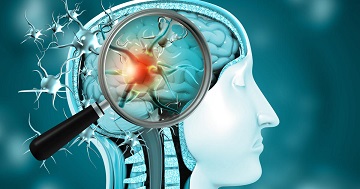University Of California Study Warns That Even Mild SARS-CoV-2 Infections Will Result In Abnormalities In Cerebrospinal Fluid and Also Cognitive Issues!
Source: Long COVID Jan 19, 2022 4 years, 1 month, 5 days, 16 hours, 42 minutes ago
Long COVID: A new study by researchers from the University of California-San Francisco has found that even in mild SARS-CoV-2 infections, abnormalities will arise in the cerebrospinal fluid and also a variety cognitive issues will manifest, often after a period of time.

The study confirmed that cognitive post-acute sequelae of SARS-CoV-2 (PASC) can occur even after mild COVID-19 through detailed clinical characterization and pathogenesis studies.
The study team evaluated 22 adults reporting cognitive PASC and 10 not reporting cognitive symptoms after mild SARS-CoV-2 infection through structured interviews, neuropsychological testing, and optional cerebrospinal fluid (CSF) evaluations (53%).
The study findings showed that delayed onset of cognitive PASC occurred in 43% and associated with younger age. Cognitive PASC participants had a higher number of pre-existing cognitive risk factors (2.5 vs. 0; p = 0.03) and higher proportion with abnormal CSF findings (77% vs. 0%; p = 0.01) versus controls.
The study findings concluded that cognitive risk factors and immunologic mechanisms may contribute to cognitive PASC pathogenesis and that manifestations of cognitive issues can be a common occurrence in
Long COVID issues of those who only had mild symptoms during SARS-CoV-2 infections.
The study findings were published in the peer reviewed journal: Annals of Clinical and Translational Neurology.
https://onlinelibrary.wiley.com/doi/epdf/10.1002/acn3.51498
It has been found that a sizeable proportion of Individuals develop new cognitive symptoms even after a mild bout of COVID and they also have abnormalities in their cerebrospinal fluid similar to those found in people with other infectious diseases.
The study finding may provide insights into how SARS-CoV-2 impacts the brain.
The study team analyzed the cerebrospinal fluid of 17 of the participants who consented to lumbar puncture in a small study with 32 adults, comprising 22 with cognitive symptoms and 10 control participants without.
All participants had only mild COVID and did not required hospitalization.
The study team found that 10 of 13 participants with cognitive symptoms had anomalies in their cerebrospinal fluid. But all four of the cerebrospinal samples from participants with no post-COVID cognitive symptoms were normal.
The median age of the participants with cognitive symptoms was 48, versus 39 for the control group.
Study participants with these symptoms presented with executive functioning issues, said senior author Dr Joanna Hellmuth, MD, MHS, of the University of California-San Francisco Memory and Aging Center.
Dr Hellmuth told Thailand
Medical News, "They manifest as problems remembering recent events, coming up with names or words, staying focused, and issues with holding onto and manipulat
ing information, as well as slowed processing speed.”
A past study showed that "brain fog", a common after-effect of COVID, affected some 67 percent of 156 patients at a post-COVID clinic in New York.
Patients in this University of California study were enrolled in the Long-term Impact of Infection with Novel Coronavirus (LIINC) study that evaluates recovery in adults with confirmed SARS-CoV-2.
Detailed examinations of the cerebrospinal fluid revealed elevated levels of protein, suggesting inflammation, and the presence of unexpected antibodies found in an activated immune system.
Some of these autoantibodies were also found in the blood and cerebrospinal fluid, implying a systemic inflammatory response, or were unique to the cerebrospinal fluid, suggesting brain inflammation.
Although the targets of these antibodies are unknown, it is possible that these could be "turncoat" antibodies that attack the body itself.
Dr Hellmuth who is also the principal investigator of the UCSF Coronavirus Neurocognitive Study and is also affiliated with the UCSF Weill Institute for Neurosciences added, "It's possible that the immune system, stimulated by the virus, may be functioning in an unintended pathological way. This would be the case even though the individuals did not have the virus in their bodies."
It should be noted that the lumbar punctures took place on average 10 months after the participants' first COVID symptom.
The study team also found that the participants with cognitive symptoms had an average of 2.5 cognitive risk-factors, compared with an average of less than one risk factor for participants without the symptoms. These risk-factors included diabetes and hypertension, which can increase the risk of stroke, mild cognitive impairment and vascular dementia; and a history of ADHD, which may make the brain more vulnerable to executive functioning issues. Other risk factors included anxiety, depression, a history of heavy alcohol or repeated stimulant use, and learning disabilities.
It was also noted that testing may fall short in diagnosing mild cognitive disorders.
All the study participants underwent an in-person cognitive testing battery with a neuropsychologist, applying equivalent criteria used for HIV-associated neurocognitive disorder (HAND).
Shockingly, the study team found that 13 of the 22 participants (59 percent) with cognitive symptoms met HAND criteria, compared with seven of the 10 control participants (70 percent).
Dr Hellmuth added, “It was found that comparing cognitive performance to normative references may not identify true changes, particularly in those with a high pre-COVID baseline, who may have experienced a notable drop but still fall within normal limits. If people tell us they have new thinking and memory issues, I think we should believe them rather than require that they meet certain severity criteria."
It should also be noted that cognitive symptoms have been identified in infections with other viruses, in addition to COVID and HIV. These include the coronaviruses SARS and MERS, hepatitis C and also the Epstein-Barr virus.
The study team concluded, "The study findings showed that individuals who were not hospitalized for SARS-CoV-2 infection can have variable onset of cognitive PASC symptoms associated with a greater number of pre-existing cognitive risk factors and abnormal cerebrospinal fluid findings."
For the latest on
Long COVID, keep on logging to Thailand Medical News.
